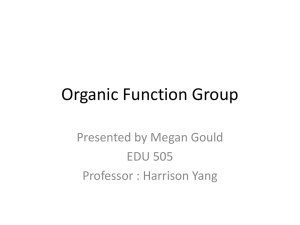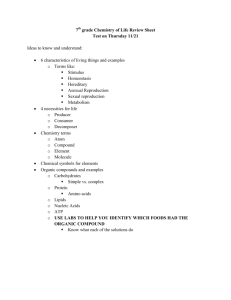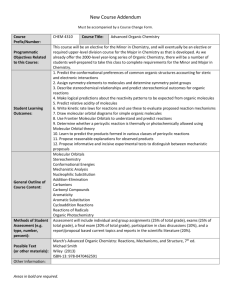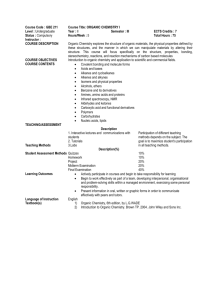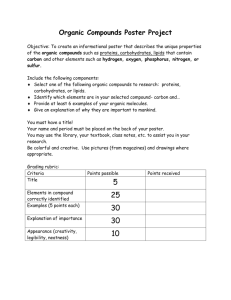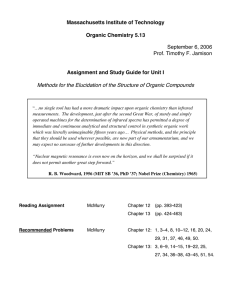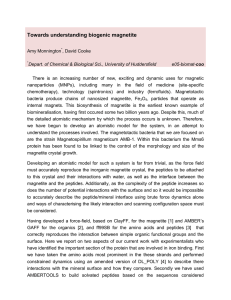view syllabus
advertisement
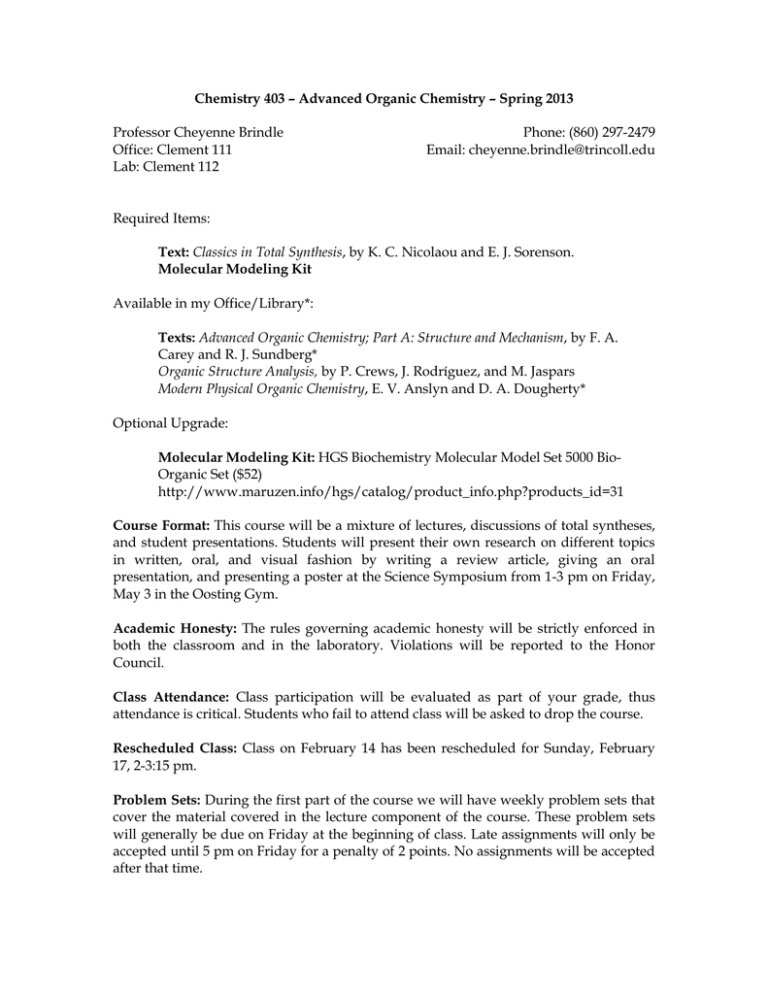
Chemistry 403 – Advanced Organic Chemistry – Spring 2013 Professor Cheyenne Brindle Office: Clement 111 Lab: Clement 112 Phone: (860) 297-2479 Email: cheyenne.brindle@trincoll.edu Required Items: Text: Classics in Total Synthesis, by K. C. Nicolaou and E. J. Sorenson. Molecular Modeling Kit Available in my Office/Library*: Texts: Advanced Organic Chemistry; Part A: Structure and Mechanism, by F. A. Carey and R. J. Sundberg* Organic Structure Analysis, by P. Crews, J. Rodríguez, and M. Jaspars Modern Physical Organic Chemistry, E. V. Anslyn and D. A. Dougherty* Optional Upgrade: Molecular Modeling Kit: HGS Biochemistry Molecular Model Set 5000 BioOrganic Set ($52) http://www.maruzen.info/hgs/catalog/product_info.php?products_id=31 Course Format: This course will be a mixture of lectures, discussions of total syntheses, and student presentations. Students will present their own research on different topics in written, oral, and visual fashion by writing a review article, giving an oral presentation, and presenting a poster at the Science Symposium from 1-3 pm on Friday, May 3 in the Oosting Gym. Academic Honesty: The rules governing academic honesty will be strictly enforced in both the classroom and in the laboratory. Violations will be reported to the Honor Council. Class Attendance: Class participation will be evaluated as part of your grade, thus attendance is critical. Students who fail to attend class will be asked to drop the course. Rescheduled Class: Class on February 14 has been rescheduled for Sunday, February 17, 2-3:15 pm. Problem Sets: During the first part of the course we will have weekly problem sets that cover the material covered in the lecture component of the course. These problem sets will generally be due on Friday at the beginning of class. Late assignments will only be accepted until 5 pm on Friday for a penalty of 2 points. No assignments will be accepted after that time. Office Hours: I will typically be in my office or nearby laboratory throughout the day, except when I am teaching or during the lunch hour. Please feel free to drop by if you have any questions. My office hours this semester will be Monday and Wednesday 8–10 am, and Thursday 1-3 pm. If you find that these hours present conflicts with your schedule, please contact me to arrange a more suitable meeting time. Exam: There will be an open-note exam for this course on April 11 in Clement 215. There will be no final exam for the course. Projects: There will be three projects during the course, a 25 minute oral presentation, a written 5-7 page paper, and a poster. The subject of the first two projects will be a organic chemistry topic of your choosing, and the poster will be on a total synthesis of your own choosing from the current literature. I will provide a list of subjects that I find interesting, but you are welcome to pursue your own topics. You must get approval from me before you begin your research in order to ensure that the topic is appropriate for the course and to avoid duplication of topics. These projects will include a revision process that includes construction of a narrative, outline generation, completing a first draft and editing. Grades: Final grades will be determined on the basis of total points accumulated during the semester. The distribution of points is as follows: 1 hour-long exam review/presentation poster 8 problem sets @ 150 points = 150 points @ 300 points = 300 points @ 150 points = 150 points @ 15 points = 120 points Total = 720 points Lecture Topics Synthetic Target Acidity and pKa’s: a Useful Tool in Predicting Equilibria Stereochemistry Advanced NMR Analysis (handout from Organic Structure Analysis) Conformation Retrosynthetic Analysis menthol (Ch. 22) amphotericin B (Ch. 24) Molecular Orbital Theory and it’s Utility for Understanding Reactivity periplanone B (Ch. 21), endiandric acids (Ch. 17) Enantioselective Synthesis prostaglandin (Ch. 5) Asymmetric Epoxidation/Aziridination (Sharpless, Jacobsen, and Evans) L-hexoses (Ch. 19) Asymmetric Reductions (Pfaltz and Noyori, CBS) menthol (Ch. 22) Hidden Symmetry carpanone (Ch. 7)

